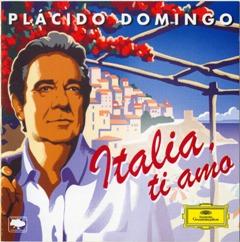Placido Domingo - Italia, ti amo (2006)
Placido Domingo - Italia, ti amo (2006)

1. Furio Rendine - Vurria 2. Stanislao Gastaldon - Musica Proibita 3. Cesare Andrea Bixio - Mamma 4. Ernesto Tagliaferri - Nun Me Sceta' 5. Lorena Tassinari - Al Di La Del Cielo 6. Ernesto De Curtis - Tu Ca Nun Chiagne 7. Eldo Di Lazzaro - Chitarra Romana 8. Emanuele Nutile - Mamma Mia, Che Vo' Sape' 9. Rodolfo Falvo - Dicitencello Vuje 10. Francesco Paolo Tosti - Non T'amo Piu 11. Placido Domingo Jr. - Quarant'anni 12. Eduardo Di Capua / Alfredo Mazzucchi - I' Te Vurria Vasa' 13. Virgilio Panzuti - Mandulinate 'E Sera 14. Giuseppe Cioffi - Na Sera 'E Maggio 15. Ernesto Tagliaferri / Nicola Valente - Passione 16. Salvatore Cardillo - Catari', Catari' (Core 'Ngrato) Placido Domingo - tenor Budapest Philharmonic Orchestra Eugene Kohn – conductor
It was said of the great tenor Enrico Caruso that he made the gramophone and the gramophone made him. In his first recordings, Caruso sang tenor arias from his stage repertoire and then any others suitable for his voice. The first operatic recordings were with piano accompaniment. Most of these were later repeated with orchestra after which he increasingly satisfied the demand for his singing with the songs of his home town, Naples. His Italian successors, particularly Gigli, continued this tradition in their recording repertoire. Later in the twentieth century these melodic Neapolitan songs reached a wider audience through the singing of the populist American-born Mario Lanza with his very emotional renditions. As the leaflet essay notes, Placido Domingo (b. 1941) is not trying to call attention to the popular aspects of these songs. Rather he views them from the perspective of an opera tenor who is specifically interested in the emotional intensity that constitutes the lifeblood of this music as much as a Puccini aria. However, whilst most of these songs were conceived for performance with piano or guitar accompaniment, Domingo has chosen to sing and record these canzone in newly prepared orchestral arrangements as have several other operatic tenors in recent years.
Well into his sixties, Domingo, ever the consummate musician never does anything by halves. His recent recording of Puccini’s Edgar (see review) and stage performances of Cyrano de Bergerac indicate his continued willingness to apply himself to learning and recording new repertoire. So it is here. I doubt if Lanza undertook language coaching to master the proper pronunciation of the Neapolitan dialect as Domingo has done for this recording. Whether the need applies to the song by his son (tr. 11) my command of Italian, let alone the dialect of the bay of Naples, precludes any comment. I do however recall that Placido senior had his son sing the shepherd boy in one of his recordings of Puccini’s Tosca. Keeping it in the family is a great principle, although I would note that Placido junior’s composition reflects the idiom well, merely extending the time-frame towards our present day.
Orchestral arrangements of these songs can give a uniformity of style that is not found in the original compositions and is, in some instances in this recording, a little overdone. With that caveat, I can only wonder at the sheer quality of vocal tone and expression that Domingo brings to the diverse emotions reflected in this collection. Also commendable is the clarity of diction and variety of vocal colour and weight that he brings to the songs whether it be in the populist Mamma Maria (tr.8) or the passionate Dicintello that follows it (tr.9). Domingo’s voice still has that free-sounding ping in its upper reaches and there is no tonal spread even when he puts pressure on at climaxes. As to Salvatore Cardillo’s ever-popular Core ’ngrato (tr.16) well all I can suggest is that you sit and glory as one of the greatest tenors of the past century enjoys himself.
As well as an introductory essay all the words are given with English translation. The recording is clear and true with no added ambience and the conductor adds supports to singer and music. ---Robert J Farr, musicweb-international.com
download (mp3 @320 kbs):
uploaded yandex 4shared mega mediafire solidfiles zalivalka cloudmailru oboom








